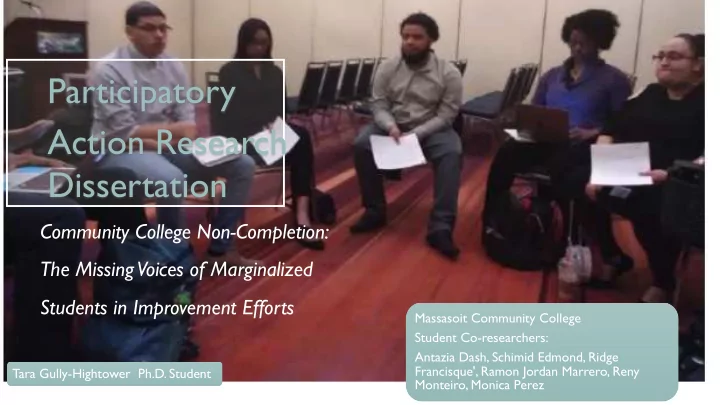

Participatory Action Research Dissertation Community College Non-Completion: The Missing Voices of Marginalized Students in Improvement Efforts Massasoit Community College Student Co-researchers: Antazia Dash, Schimid Edmond, Ridge Francisque', Ramon Jordan Marrero, Reny Tara Gully-Hightower Ph.D. Student Monteiro, Monica Perez
CRITICAL THEORETICAL FRAMEWORKS INFORMING THIS PROJECT
Cycles of PAR Identify the issues; gather data; analyze data; plan & take action; reflect on action ; repeat the process
Identify issues – embodiment theory and identification of stress in student’s bodies Suggestion of mentoring program as Research: What causes a more long-term way stress-the relationship for future students to between stress and be able to attend sleep? college and experience less stress Share findings Collect data on what Student suggestions for students do currently how the institution can to relieve stress & help relieve stress on Students’ suggestions campus for relieving stress Share findings
Cycle One: Where do you feel your experiences of being on campus in your body?
Sharing Embodiment Data with the Community
STUDENT RESEARCHERS COLLECTED DATA FROM OTHER STUDENTS ON CAMPUS “IDEAS TO HELP STUDENTS STRESS AT MASSASOIT?”
STUDENT-GENERATED THEMATIC CODES & C ATEGORIES FOR SURVEY RESULTS ON HELPING REDUCE STUDENTS’ STRESS WHILE THEY ARE ON C AMPUS
Moments 1) WHEN DATA IS RE-GROUPED INTO C ATEGORIES RELATED TO EXISTING INSTITUTIONAL STRUCTURE CHANGES & STUDENTS’ DESIRE FOR ADDITION AL SUPPORT ON C AMPUS (NON-AC ADEMIC) 2) “A PLACE FOR….” OR “SPACE FOR” WERE PHRASES REPEATED 43 TIMES IN THE DATA 3) A C ALL FOR “HEALING” AND/OR “SUPPORT” WERE MENTIONED 57 TIMES.
Significant Statements Emerging Themes Critical Theory Axial Codes (Emic) (Emic/Etic) (Etic) (Etic) ‘Puppy room” A need for play and simple Participant conveys that Not enough nice bonding A NEED joy of experience” they need love and opportunities on campus. FOR A desire to cuddle small companion ship to reduce fuzzy animals stress “A PLACE” “Students do not have Feeling of lacking Participant conveys partial Structures do not serve the dorms” recognition that current students best or ”SPACE” Understanding that they are system around tardiness and different than students at the class schedules are based Mentioned 42 colleges with dorms-but on “norms” that do not fit the • times in the frustration that the schedule current student body. and practices at the college are survey following a structure that does responses not fit with their circumstances “Game room” A place to play does not exist Play and movement are needs that are not currently being met “Gym/pool accessibility” Need for physical movement Physical activity and learning No space/schedule not met by the college and stress reduction are linked practices that fit…. college facilities” not serving everyone’s needs “comfy chairs in Physical needs in classrooms Physical needs not being classrooms” not met met Physically not comfortable in classes “Dance hall in the student Participant conveys a desire to Movement, play self-expression Movement, play self-expression center” dance are lacking are lacking
PAR Student Mentorship Mission To Improve campus experience for students and Inspire others through Dedicated guidance to Be motivational, Make changes and Interrupt stereo- types MOST Value Statement RECENT Values: Our Behavior: ACTION Community Honesty Education Openness Youth Genuine Help everyone Positive Understanding Good listeners Our Uniqueness: Engaging with peers Presentations! “student oriented” Reaching the Unreachable Resources: Trio
“We went from listening to authority to becoming the authority” - Ridge Francisque' STUDENTS PRESENT AT AERA 2019 MCCPAR.COM
REFERENCES Foucault, M. 1977. Discipline and punish: The birth of the prison. New York: Vintage Freire, P . (1970). Pedagogy of the oppressed (M. Bergman Romas Trans.). New York: Bloomsbury Publishing. Krueger-Henney, P . (2016). What are we listening for? (participatory action) research and embodied social listening to the permanence of anti-black racism in education. The International Journal of Critical Pedagogy, 7 (3). Ladson-Billings, G. (1998). Just what is critical race theory and what's it doing in a nice field like education? International Journal of Qualitative Studies in Education, 11 (1), 7-24. Patel, L. (2015). Decolonizing educational research: From ownership to answerability. Routledge. Ruglis, J. (2011). Mapping the biopolitics of school dropout and youth resistance. International Journal of Qualitative Studies in Education, 24 (5), 627-637. Tuck, E. (2009). Suspending damage: A letter to communities. Harvard Educational Review, 79 (3), 409-428.
Recommend
More recommend